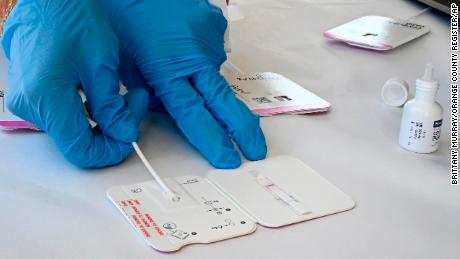(CNN)The fight against the coronavirus has entered a new stage with the emergence of the omicron variant. As it spreads, cases are rising in much of the United States.
This new stage comes at a time when the public seems to be worn out by the virus and is less likely to want mandatory restrictions or want to take voluntary precautions that could help to stop the spread of the virus.
Take a look at a recent Monmouth University poll that asked how people felt about the coronavirus. Six in 10 Americans say they feel at least a little bit worn about how the virus has impacted their daily lives. And unlike with a lot of other emotions and actions revolving around the coronavirus, there is no partisan split around feeling at least a little worn out. Republicans come in at 64% and Democrats at 63%.
This exhaustion with the virus might be part of the reason why people are simply less likely to make major changes to their everyday lives. The peŌĆŗŌĆŗrcentage of Americans who feel safe to carry on their lives largely in the same way they did before the pandemic is up from 36% in a CNN/SSRS poll completed in early September to 45% in a new CNN poll released this month.
Just 45% of Americans say they have socially distanced in the last week, according to an Axios/Ipsos poll released this week. That's about the same as it's been since the beginning of summeŌĆŗŌĆŗr. It's much lower than the 79% it was last December, before vaccines became widespread.
Likewise, a majority of Americans say they have gone out to eat, visited with friends or relatives, or visited a non-grocery retail store in the last week. Last winter, these were all minority positions.
Not only are more people going outside of their home, but they're far less likely to wear a mask when doing so. Only 38% of Americans report wearing a mask at all times in the last week in the Ipsos poll. This isn't much different than it was in other polls taken since this past summer. Last December, about double the percentage of Americans (74% on average) said they always wore a mask when outside of their home.
And when it comes to the willingness to vaccinate themselves, Americans really haven't budged. In the Ipsos poll, the percentage of adults with at least one dose or likely to get one has bounced between 78% and 83% in every poll taken since September. The Monmouth poll has the percentage who have already received or are likely to get one as soon as possible at 78%, which is the range (77% to 81%) it's been within since September.
As for booster shots, there continues to be a major dropoff compared to getting a first shot. Only 51% of adults say they have gotten one or will very likely get one in the Monmouth poll. This is the same as it was last month, even with omicron now on the table. CNN's poll found that only 46% of Americans say they've been boosted or have tried to schedule a booster.
Beyond just voluntary measures, the public seems no more likely to want too much government intervention either to control the spread. A majority (55%) in the Monmouth poll want the government to instituting mask and social distancing guidelines. This is not statistically significantly higher than it was this summer and actually lower than the 63% who wanted it back in September.
CNN's poll put support for mask mandates in public indoor spaces at just 49%.
When it comes to vaccine mandates, we've seen a gradual decline in support across a lot of polling. In the Monmouth poll, for example, 46% support a mandate for people to go to a job in which they're around other people. This was 51% in November and 53% in September. Now, 50% oppose it.
Even in the CNN poll, which showed a slight increase in the percentage of Americans who favored requiring vaccines for everyday to take part in everyday activities outside the home, support was just 54%.
The tŌĆŗŌĆŗruth is that a lot of people seem to want to move on from the fights of the coŌĆŗŌĆŗronavirus that have consumed our society for nearly two years. There are other issues (mainly the economy) that the public deems to be bigger problems.
In that Monmouth poll, a mere 18% listed the coronavirus as the most pressing concern for their family right now. That's barely any different than the 17% who said so in July. It's much lower than the 39% who said the coronavirus in August 2020. Economic concerns (everyday bills, inflation, job security and employment, and the economy overall) came in at 41%.
The question now is whether these numbers shift in the coming weeks as we fully enter winter. It's plausible, if things get really bad. So far, though, it hasn't happened.




